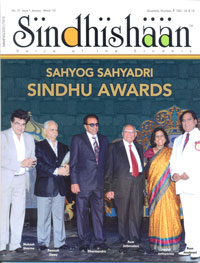AND LIFE GOES ON
By Arun Babani

TWO WINGS OF A BIRD
The Upanishads have a story symbolizing human life. Two birds have made a nest on the tree of existence. One of them is forever playful, chirping and active. He jumps from one branch to the other, eats, dances and generally enjoys himself. And the other bird sits calmly in one place and watches the first one with a cool and collected awareness. Says the Upanishads, “Human being is both these birds, active and passive, yes and no together.” Sigmund Freud discovered that man’s life is measured by the success and failure in two areas of his life – Work and Love. Osho named his New Man as Zorba the Buddha, signifying the two aspects of the outer and inner.
In all these examples we can see that a human being is made of two polarities of inner and outer, this world and the other world, the market place and the meditative space. Both these worlds make up a complete human being. Nowadays more and more people and institutions have become aware of the fact that if they don’t meditate while at work, and if they don’t create while they sit meditating, something is missing. One of the biggest companies of men’s wear in India created an Ad campaign symbolizing this complete man, where the gentleman makes tough decisions in the Boardroom and then goes off fishing with his daughter. Another international airline advertises their meditative space on the flights. The world is finally coming to terms with the monotony of outer reality by now introducing bit-sized chunks of the Buddha in daily life. Osho was always aware of these two extremes of the market place and the monastery and warned against this lopsidedness in society. The materialist who sits in the market and the meditator who sits in the monastery were successfully combined by Osho into a synthesis of Zorba the Buddha. He insisted that in this way we are that much enriched, completed and wholesome.
ETERNAL HERE AND NOW
Suddenly one morning a call came from somewhere to meditate on the eternal. My mind immediately began to race about; eternal? Images of eternal snow-capped mountains, the eternal sky, the eternal ocean with its eternal waves braced passed my mind. After a brief silence it began to slow down and the eternal seemed like some sort of a riddle. Eternal which meant beginingless and endless…the mind cannot capture it, it needs a time frame to think about something but the limitless is beyond thought. Eternal is not something to get hold of, to capture it as an idea and understand it. The mind, taking a break was suddenly thrown into this moment, here and now. Again it started to kick about thinking of here and now as an idea or knowledge. But here and now is only a silent form of energy. Eternal is in this moment, very fragile, fleeting and absolutely empty. Being thrown into this moment the mind began to suffocate and gave up. For a little while of stillness, my eyes wandered around the room and rested on a flower pot. Is this flower eternal or momentary? Or is it that the eternal is hidden in the momentary and the momentary is enveloped by the eternal? I think it is forever here and now and whenever one closes the door to the outside it appears in the form of the eternal. The energy in the here and now is the eternal.
OF NOUNS AND VERBS
Language is full of nouns and life is made of verbs. For example the noun ‘river’, language makes a river a noun, but in actuality it is a verb because it is flowing, rivering, moving, growing without a gap. River makes it static and dead. Same is the case with a tree or a bird or a cloud. All these phenomena of life are never at rest, but move continuously and change forms all the while. So one cannot call them by words that do not bring out their ever flowing and moving nature. Language is full of fixed and dead labels, like ‘flower’, ’child’, ’dog’ or ‘sunset’. But the sun is always in a flux, setting, and setting and setting. A language that is closer to life’s mysteries will have verbs like rivering, treeing, and clouding. Osho prefers the verb ‘relating’ to relationship which is a fixed and static noun. Similarly he preferred ‘friendliness’ to friendship and ‘Godliness’ rather than God. Labels are utilitarian and language is a social affair but when we encounter reality in its raw formlessness, we must leave language behind, aloof from words and labels and actually come face to face with life’s hidden splendour. Paul Eluard said “there is another world, but it is in the midst of this world.”
I Don't Know
Osho often tells of this incident in Socrates’ life – The Oracle of Delphi declared Socrates to be the wisest man in Greece. Upon hearing this declaration a man went to Socrates and told him about it. Socrates is said to have laughed loudly and told the man to go and tell the Oracle that there seems to be some mistake, “I know one thing that I don’t know anything.” The man went back and told the Oracle all about the utterance of Socrates and the Oracle told him, “that is precisely why I declare Socrates as the wisest man on earth.”
Osho encouraged his disciples to go into deeper spaces of the statement ‘I don’t know’. A disciple once asked him “people ask me from where I am, which country, nation, and locality? It takes me a while to answer because many a times I forget and don’t know what to reply.” And Osho said that there is no need to know all these superficial details about oneself. At the most say, ’maybe’, ’perhaps’ or else nothing can be pinpointed about oneself except the market designations. An Indian mystic met a gentleman at a gathering and asked him, “What do you do in life?” Prompt came the reply “I am a doctor.” To which the swami replied “That you do for a living. I asked what you do in life” The man was dumbfounded.
To remain in the ‘I don’t know’ is to remain without a center, without a mind, without the ‘I’. I don’t know means that the ‘I’ dissolves. To be in the ‘I’ is to be in the knowledge which is needed if you have to learn a new language or a new mechanical skill. This sort of knowledge is possible, even required. But psychological knowledge is not possible and not even needed. As one travels higher and deeper into life this sort of knowledge can be left aside and the deeper layers of mystery can be allowed.
Osho distinguishes between three layers of knowledge: the ‘known’ which is the common everyday knowledge. Then there is the ‘unknown’ which can become known over a period of time by knowledge and learning. Effort of all science is to make the unknown known. Then there is the third category, the ‘unknowable’. Religion deals with this area of life. For example religion deals with love. No systematic knowledge is ever possible about love. You can know love by falling in love. Beauty or truth, all these deeper phenomena of life need no knowledge. There are instinctual and inborn and cannot be understood in the sense of knowledge. About the essentials of life, only the ‘silence’ works. When one comes upon the ‘I don’t know’, one comes upon that mysterious, the unknowable and the miraculous silence.


